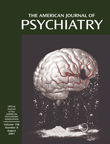To the Editor: In his article
(1), Gordon Parker, M.D., Ph.D., D.Sc., F.R.A.N.Z.C.P., suggested that the “approach to pursuing potential nonmelancholic subgroupings” is to clinically identify “meaningful syndromes” (p. 1199) with “substantive treatment-specific implications” (p. 1201). We agree with these guidelines, but the failure to include atypical depression as a nonmelancholic subtype is a shortcoming. Atypical depression is included in DSM-IV (296.2) as a parenthetical modifier of major depressive disorder. Atypical depression has been studied in a variety of contexts; a literature review suggests this work fulfills many of Dr. Parker’s criteria and indicates its clinical utility.
Psychopharmacological dissection has been used to identify clinically meaningful subtypes among moderately ill, depressed patients
(2). In a series of studies
(3–
7), patients with nonautonomous mood disorder received imipramine, phenelzine, or placebo. On the basis of this work, depressive subtypes were identified: a subgroup with atypical depression (overeating and oversleeping) that was characterized by poor response to tricyclic antidepressants (65 of 147, 44%) and good response to monoamine oxidase inhibitors (MAOIs) (118 of 165, 72%) and a second group with simple mood-reactive depression (mild typical) that was characterized by a good response to both tricyclic antidepressants and MAOIs. In both groups, response to placebo was approximately 25%.
By use of items from the Hamilton Depression Rating Scale, a measure of endogeneity (melancholia) was constructed. This analysis implied that melancholic symptoms did not seem to be a precondition for imipramine benefit in this group, which suggests that mild typical depression might differ from severe typical depression (melancholia). Clearly, this distinction is not as well supported as that of atypical depression versus other depressions. The prospective identification of a group with a superior response to MAOIs (versus tricyclic antidepressants) supports a unique pathophysiology and a distinct subtype
(8).
A prospective epidemiological study by Kendler et al.
(9), using latent class analysis, identified mild typical, atypical, and severe typical depression as categorically distinct subtypes. Subjects with atypical depression were characterized by overeating and oversleeping and a high concordance in monozygotic but not dizygotic twin pairs. The syndrome appeared stable over time. Sullivan et al.
(10) independently reproduced this typology and noted, “Particularly interesting…was the identification of depressive classes defined principally by the atypicality of the symptoms.”
In another context, the concept of atypical depression helped clarify an obscure outcome in a study contrasting imipramine treatment and two types of psychotherapy
(11). The effect of imipramine on subjects with nonatypical depression produced a much brighter signal than psychotherapy when patients with atypical depression were separately analyzed. As anticipated, the response of atypically depressed subjects to imipramine did not surpass their response to placebo.
Although no treatment has been shown equal to that of MAOIs, imipramine, and some second-generation drugs, it is important to identify patients with an atypical depressive subtype
(12). Subjects with atypical depression who fail to respond to one or two trials with newer antidepressants should receive a trial with an MAOI. These studies meet Dr. Parker’s concerns and amplify his conclusions. Patient types identified by two distinct approaches, latent class analysis and psychopharmacologic dissection, had strikingly similar phenomenology
(8–
10). The use of MAOIs, especially in subjects with atypical depression who have failed to respond to other treatments, is not as widely appreciated as it should be.

